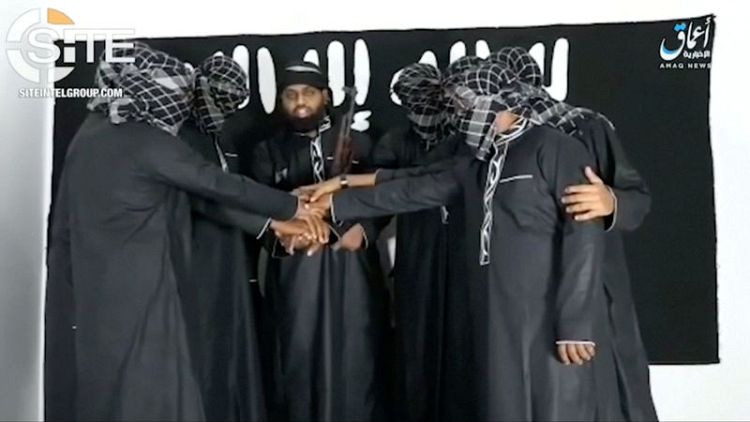By Sanjeev Miglani and Joe Brock
COLOMBO (Reuters) - Details began to emerge in Sri Lanka on Wednesday of a band of nine, well-educated Islamist suicide bombers, including a woman, from well-to-do families who slaughtered 359 people in Easter Sunday bomb attacks.
The Islamic State militant group claimed responsibility for the coordinated attacks on three churches and four hotels. If that connection is confirmed, the attacks looks likely to be the deadliest ever linked to the group.
Both the Sri Lankan government and the United States said the scale and sophistication of the coordinated bombings suggested the involvement of an external group such as Islamic State.
The Islamist group released a video late on Tuesday through its AMAQ news agency, showing eight men, all but one with their faces covered, standing under a black Islamic State flag, declaring loyalty to its leader, Abu Bakr Al-Baghdadi.
The one man in the video with his face uncovered was Mohamed Zahran, a Sri Lankan preacher known for militant views.
While the video showed eight men, Sri Lanka's junior defence minister, Ruwan Wijewardene, said there were nine suicide bombers. Eight had been identified and one of them was a woman, he said.
"Most of the bombers are well-educated, come from economically strong families. Some of them went abroad for studies," Wijewardene told a news conference.
"One of them we know went to the UK, then went to Australia for a law degree. Foreign partners, including the UK, are helping us with those investigations."
Two of the bombers were brothers, sons of a wealthy spice trader and pillar of the business community, a source close to the family said.
Intelligence officials and Prime Minister Ranil Wickremesinghe believe that Zahran, a Tamil-speaking preacher from the east of the Indian Ocean island country, may have been the mastermind.
He was well-known for his militant views and fiery Facebook posts, according to Muslim leaders and a Sri Lankan intelligence report issued earlier and seen by Reuters.
The government suspects two Sri Lankan Islamist groups - the National Thawheed Jama'ut, of which Zahran was believed to have been a member, and Jammiyathul Millathu Ibrahim - were responsible, with outside help.
GRAPHIC: Sri Lanka bombings - https://tmsnrt.rs/2Xy02BA
MISSED WARNINGS
The early Sunday bombings shattered the relative calm that has existed in Buddhist-majority Sri Lanka since a civil war against mostly Hindu, ethnic Tamil separatists ended 10 years ago, and raised fears of a return to sectarian violence.
Sri Lanka's 22 million people include minority Christians, Muslims and Hindus. Until now, Christians had largely managed to avoid the worst of the island's conflict and communal tensions.
The U.S. Federal Bureau of Investigation and military were also supporting the investigation into possible foreign connections, the U.S. ambassador to Sri Lanka, Alaina Teplitz, told reporters.
"If you look at the scale of the attacks, the level of coordination, the sophistication of them, it's not implausible to think there are foreign linkages," Teplitz said.
As well as the huge death toll, 500 people were wounded in the worst ever such militant attack in South Asia.
It has also exposed a significant Sri Lankan intelligence failure, with warnings of strikes not acted on and feuds at the highest levels of government.
"It is a major lapse in the sharing of intelligence information," Wijewardene said. "We have to take responsibility."
Lakshman Kiriella, the leader of parliament, said senior officials had deliberately withheld intelligence about possible attacks.
"The top brass security officials did not take appropriate actions," Kiriella, who is also minister of public enterprise, told parliament.
He said information about possible attacks was received from Indian intelligence on April 4 and a Security Council meeting was chaired by President Maithripala Sirisena three days later, but it was not shared more widely.
Sirisena has said his office never received the Indian report. The prime minister also had not been told of warnings of an attack, a minister said.
The president fired Prime Minister Wickremesinghe last October over political differences, only to reinstate him weeks later under pressure from the Supreme Court.
Two sources close to the president said he had asked the police chief and defence secretary to resign.
'CHECKING ON MUSLIM AREAS'
A total of 60 people have been detained for questioning across Colombo, Wijewardene said. That total includes a Syrian, according to security sources.
Raids included areas near the Gothic-style St Sebastian church in Negombo, north of the capital, where scores were killed on Sunday, a police spokesman said.
An unspecified number of people were detained in western Sri Lanka, the scene of anti-Muslim riots in 2014.
"Search operations are going on everywhere, there is tight checking of Muslim areas," a security source said.
Most of those killed and wounded were Sri Lankans, although officials said 38 foreigners were also killed. That included British, U.S., Australian, Turkish, Indian, Chinese, Danish, Dutch and Portuguese nationals. Forty-five children were among the dead.
The government has imposed emergency rule and an overnight curfew. It said it has also blocked online messaging services to stop the spread of inflammatory rumours that it feared could incite communal clashes.
(Reporting by Sanjeev Miglani; Editing by Paul Tait, Robert Birsel and Alex Richardson)
